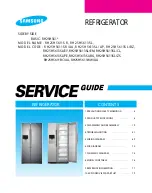
29
solving problems
cleaning and servicing
your refrigerator
•
Always disconnect your refrigerator
before any type of servicing.
•
Never use toxic products, abrasives,
or steel-wool sponges as these will
damage the surface of your product.
•
Use a soft sponge or damp cloth, and
a neutral soap to wash. Rinse the refrigerator, and dry it with a clean
and dry cloth. You can also use a solution of bicarbonate of soda (one
tablespoon dissolved in two litres of tepid water) to clean the inside.
•
Don’t use steel-wool sponges or sharp objects as these could scratch
the refrigerator or its shelves.
•
To make cleaning easier all our models come with high-resistance
glass shelves with anti-spill edges. These give you time to clean liquid
spillages before they spread.
•
Use a brush, cloth, or sponge to remove dust build-up from the
condenser. Try to do this at least once every 6 months.
heating of areas near the freezer
Your refrigerator comes with an anti-condensation
mechanism.
The heating of some areas external to your
refrigerator is normal. This happens to prevent
water droplets from condensing on the outside of
your refrigerator. However, if room temperature
and humidity are higher than usual, light
condensation may form. Dry with a cloth.
general precautions
•
Don’t touch the inside of the freezer door with wet hands.
•
Don’t let children hang from the doors or play near the refrigerator
when the door is open, as they may injure themselves, bang into it, or
get trapped.
•
Don’t let children hang from shelves or the Smart Station door, as
excessive weight could break these.
•
Sometimes, it can cause trouble to reopen the refrigerator door
immediately after closing. This normal occurrence is a result of a
vacuum formation inside the refrigerator, caused by air at different
temperatures combining. Wait 10 to 15 seconds and the doors will
open easily once again.
Before throwing out your old refrigerator or freezer, take the following pre-
cuations to prevent the risk of a child entrapment.
•
Take off the doors
•
Leave the shelves in place so that children may not easily climb inside.







































